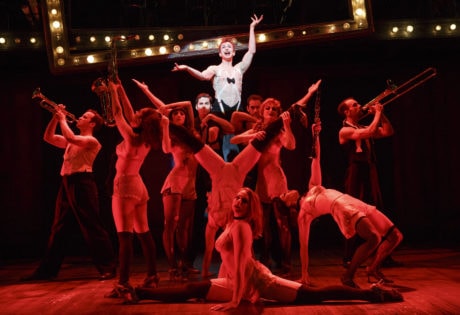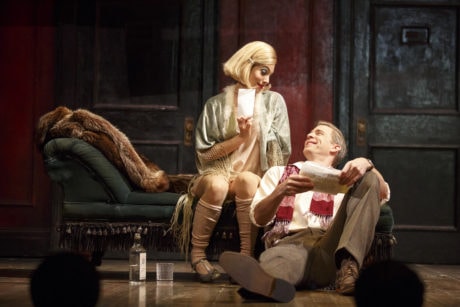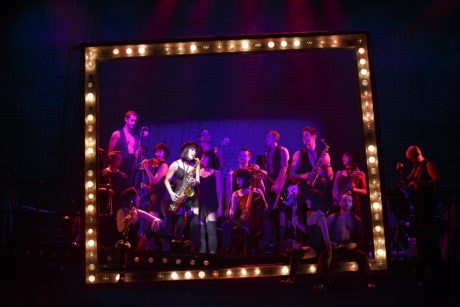Some shows never get old or lose their impact. The national tour of Roundabout Theatre Company’s Tony Award-winning revival of Cabaret, making its Philadelphia premiere for a limited run this week at the Academy of Music, is still as stunning as the original by Joe Masteroff (book), John Kander (music), and Fred Ebb (lyrics) was when it made its Broadway debut in 1966. Presented in the Broadway Philadelphia series by the Kimmel Center for the Performing Arts and The Shubert Organization, and directed by BT McNicholl (after the original Roundabout direction of Sam Mendes and Rob Marshall), this latest incarnation in a long pedigree of stellar productions captures all of the decadence and depravity, desperation and devastation inherent in the ominous story of life in the underbelly of Berlin, Germany, 1929-30, on the cusp of the Nazi rise to power.
Based on Christopher Isherwood’s semi-autobiographical novella Goodbye to Berlin (1939) – which inspired John Van Druten’s 1951 play I Am a Camera, a movie of the same name in 1955, then the Kander-and-Ebb musical and its Academy Award-winning film adaptation of 1972 – the narrative revolves around the denizens of the city’s seamy Kit Kat Klub, the residents of a Berlin boarding house, their attitudes toward life, and their inter-relationships with each other. American writer Clifford Bradshaw (Isherwood’s alter ego), in Europe to work on his novel, experiences it all, from the unabashed hedonism of the nightspot, to the fascist control and intolerance that creep in around him, to the doomed engagement of his elderly landlady and a Jewish fruit-seller, and his own ill-fated affair with Sally Bowles, the promiscuous English headliner at the cabaret.

Overseeing the array of dissipated proceedings is the club’s omnipresent and insatiably-lascivious Emcee, portrayed with inescapable seductiveness by the amazing Jon Peterson. From the moment he welcomes us (with the blockbuster opening “Willkomen”), he captivates with his full-out pansexual salaciousness and darkly impish allure. His well-feigned German accent, rapturous vocals, enticing moves, and provocative interactions with the audience are all played to perfection, as we follow him around the stage, up and down the bi-level set, through the doors, and into the aisles, thoroughly commanding our attention until the final tragic scene. He is accompanied by an astonishingly flexible ensemble of bawdy Kit Kat Girls (Jenna Zito Clark, Chelsey Clark, Laura Sheehy, Kendal Hartse, Alison Ewing, and Sarah Bishop) and tantalizing Kit Kat Boys (Joey Khoury, Andrew Hubacher, Ryan DeNardo, and Tommy McDowell), all of whom double as musicians in the dynamic Kit Kat Band, expertly conducted by Musical Director and pianist Robert Cookman, with masterful orchestrations by Michael Gibson. Among the most amusing highlights of Peterson’s numbers with the Kit Kats are the exuberant paean to “Money” and the ribald “Two Ladies” – which, in the Roundabout production, is performed by one lady (Chelsea Clark’s Lulu) and one cross-dressing man (Khoury’s Bobby), to underscore the fluid sexuality of the characters, with Cynthia Onrubia recreating Rob Marshall’s original racy choreography.
Benjamin Eakeley as Cliff believably develops his character from the eager visitor indulging in all that Berlin has to offer (and lending his melodious voice to the buoyant duet “Perfectly Marvelous”) to the keen outside eye who becomes increasingly aware of the seriousness of the political situation and the dangers his heedless friends are about to face (“Wake up! The party’s over!” he warns). Leigh Ann Larkin as Sally is appropriately flirtatious and frivolous about her chosen profession in “Don’t Tell Mama,” while cold and callous in the boot-stomping blow-off “Mein Herr,” but generally lacks the ferocious intensity needed for the role. Her rendition of the title song is less stridently exultant of her character’s sybaritic lifestyle than it is fraught with a melodramatic turn of sudden self-realization and despondency (a directorial choice in the Roundabout’s interpretation), which here lacks depth and credibility.

Bringing warmth, sympathy, and humanity to their mature characters, and powerful voices to their songs, are Mary Gordon Murray as the boarding-house owner Fräulein Schneider and Scott Robertson as her kind-hearted suitor Herr Schultz; their duets on “It Couldn’t Please Me More (A Pineapple)” and “Married” are especially heartfelt and expressive. She is world-weary and defeated, questioning “So What” and “What Would You Do?” as she accepts what she doesn’t have the strength to fight and resigns herself to the inevitable. He is generous and self-deluding, convinced that he is a real German and will be protected by his country despite its fermenting anti-Semitism, even as a brick is thrown through his window and the strains of the Nazi anthem “Tomorrow Belongs to Me” resound all around him. By contrast, Patrick Vaill as the deceitful Ernst Ludwig and Alison Ewing as the manipulative Fräulein Kost become more and more hateful as the future they want for Germany unfolds.
A top-notch design thrusts us into the show’s disturbing era and dark ambience, with William Ivey Long’s tawdry costumes for the scantily-clad Kit Kats; flashing marquee lights, noir-style spotlighting, and red, blue, and white floodlights by Peggy Eisenhauer and Mike Baldassari that define the mood; and a striking two-tier set by Robert Brill, centered on a monumental picture frame deliberately hung off-kilter as a symbol of a culture gone askew.
From its extraordinary score and design to its impactful message and performances, the Roundabout’s touring production of Cabaret reaffirms the show’s position as one of the greatest musicals in Broadway history, so be sure to catch it while it’s here. I guarantee they’ll be “happy to see you.”
Running Time: Approximately two hours and 30 minutes, including an intermission.

Cabaret plays through Sunday, April 9, 2017, at the Academy of Music – 240 South Broad Street, in Philadelphia, PA. For tickets, call (215) 893-1999, or purchase them online.




